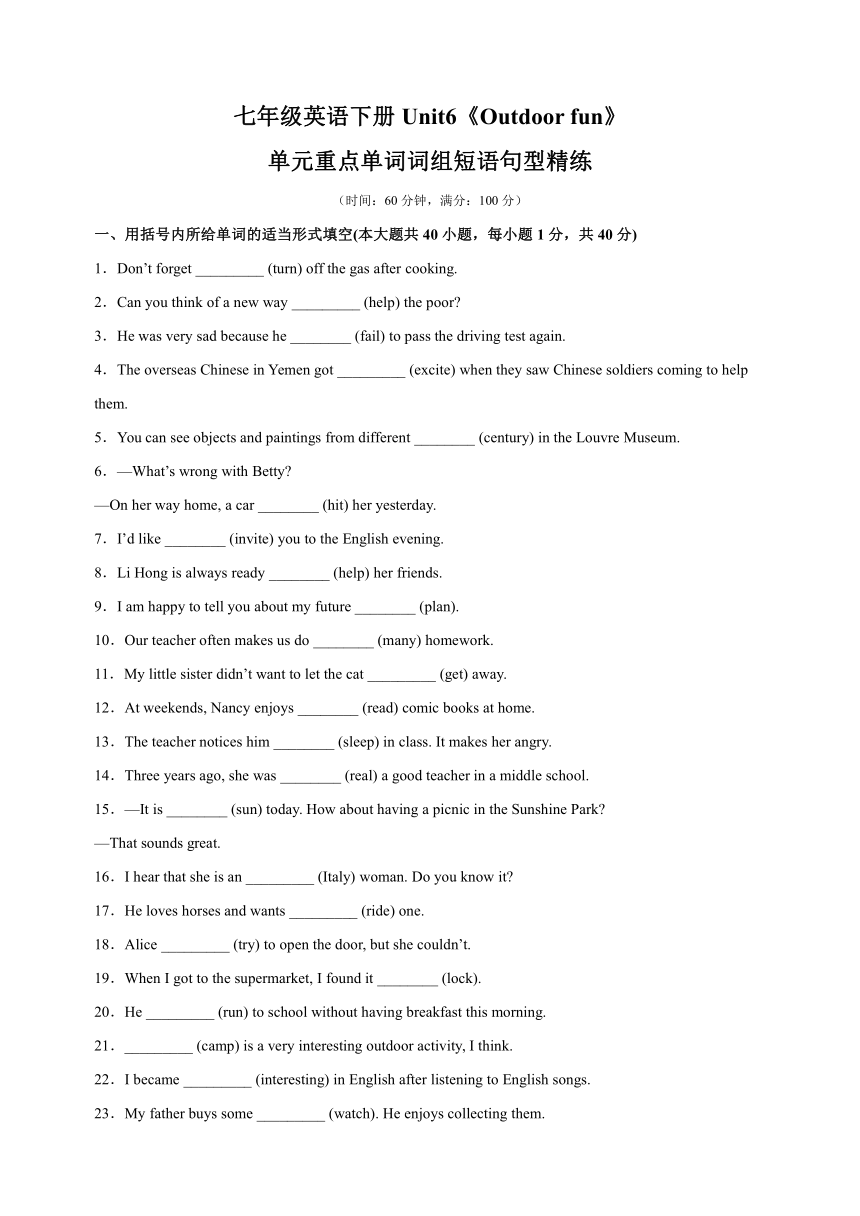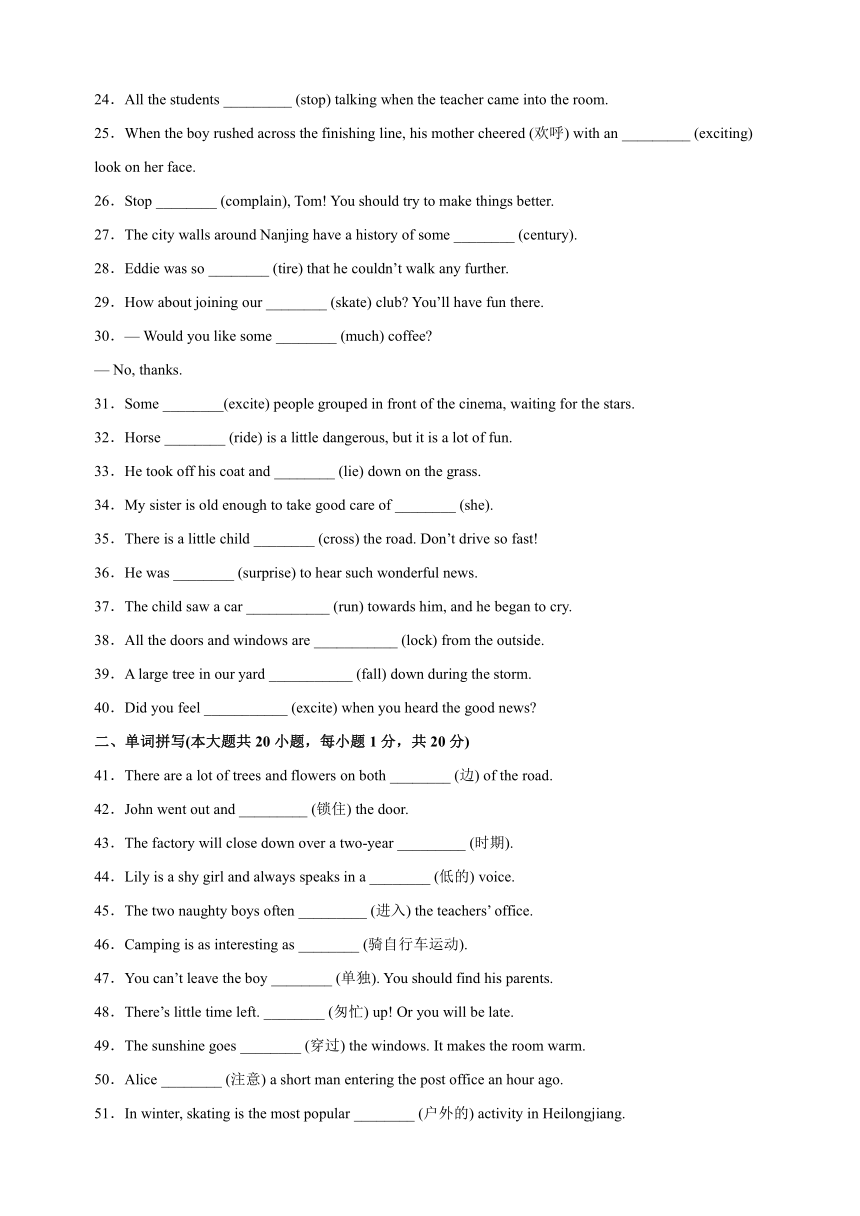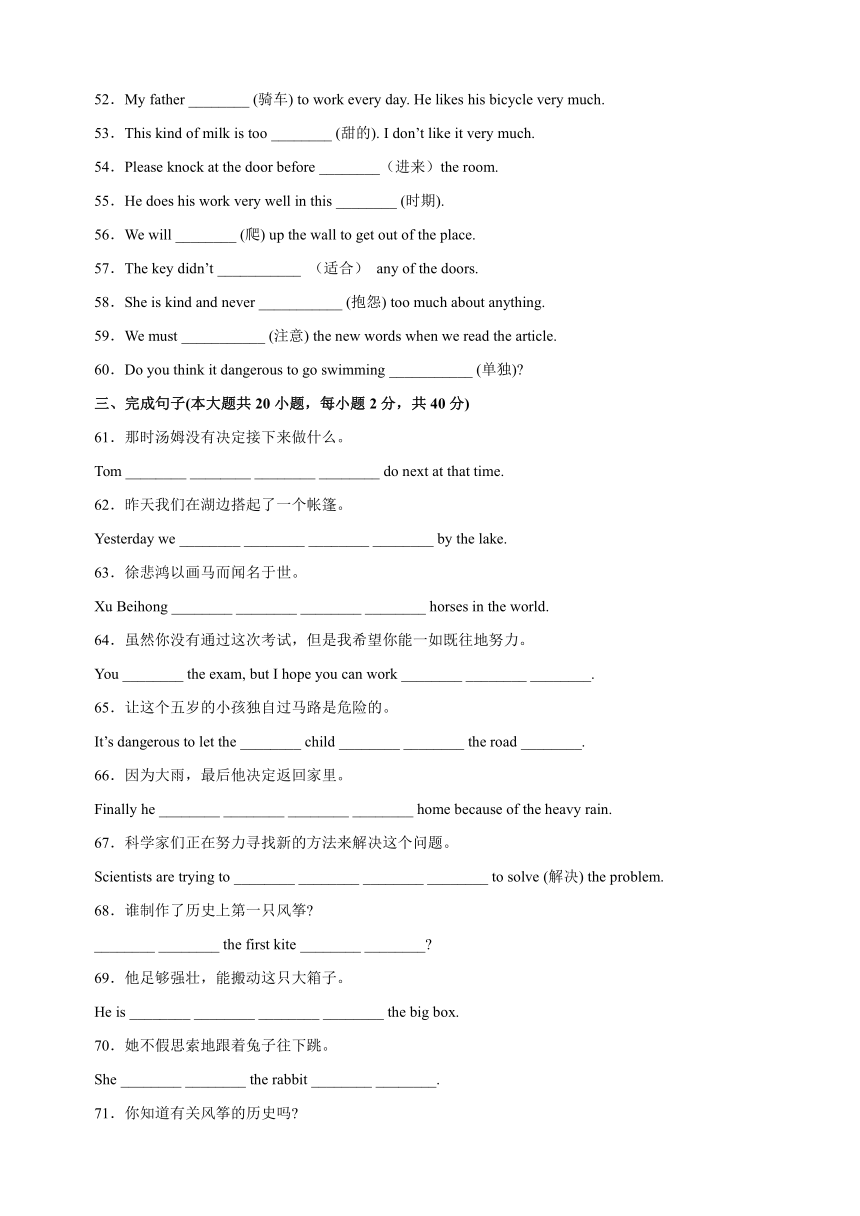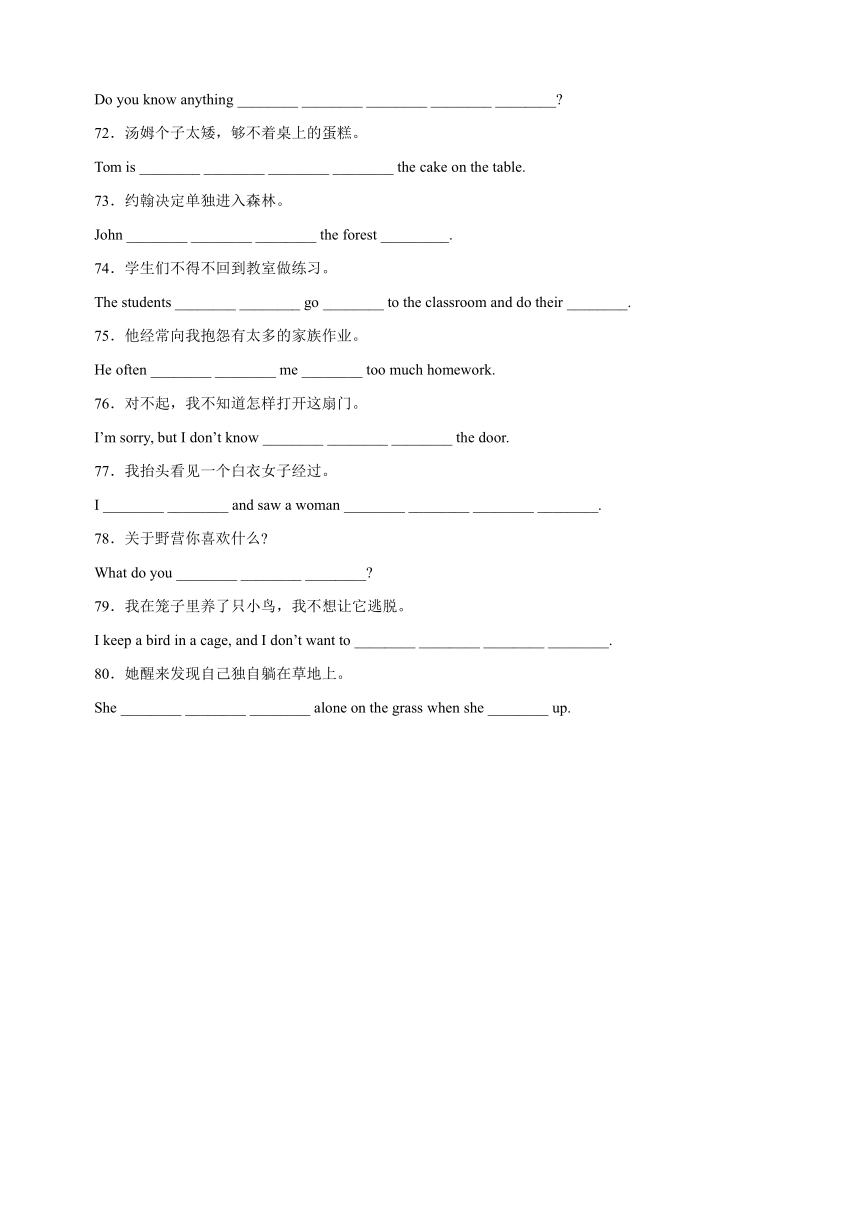Unit6 Outdoor fun 单元重点单词词组短语句型精练(含答案解析)
文档属性
| 名称 | Unit6 Outdoor fun 单元重点单词词组短语句型精练(含答案解析) |  | |
| 格式 | doc | ||
| 文件大小 | 61.5KB | ||
| 资源类型 | 教案 | ||
| 版本资源 | 牛津译林版 | ||
| 科目 | 英语 | ||
| 更新时间 | 2024-03-29 13:15:42 | ||
图片预览





文档简介
七年级英语下册Unit6《Outdoor fun》
单元重点单词词组短语句型精练
(时间:60分钟,满分:100分)
一、用括号内所给单词的适当形式填空(本大题共40小题,每小题1分,共40分)
1.Don’t forget _________ (turn) off the gas after cooking.
2.Can you think of a new way _________ (help) the poor
3.He was very sad because he ________ (fail) to pass the driving test again.
4.The overseas Chinese in Yemen got _________ (excite) when they saw Chinese soldiers coming to help them.
5.You can see objects and paintings from different ________ (century) in the Louvre Museum.
6.—What’s wrong with Betty
—On her way home, a car ________ (hit) her yesterday.
7.I’d like ________ (invite) you to the English evening.
8.Li Hong is always ready ________ (help) her friends.
9.I am happy to tell you about my future ________ (plan).
10.Our teacher often makes us do ________ (many) homework.
11.My little sister didn’t want to let the cat _________ (get) away.
12.At weekends, Nancy enjoys ________ (read) comic books at home.
13.The teacher notices him ________ (sleep) in class. It makes her angry.
14.Three years ago, she was ________ (real) a good teacher in a middle school.
15.—It is ________ (sun) today. How about having a picnic in the Sunshine Park
—That sounds great.
16.I hear that she is an _________ (Italy) woman. Do you know it
17.He loves horses and wants _________ (ride) one.
18.Alice _________ (try) to open the door, but she couldn’t.
19.When I got to the supermarket, I found it ________ (lock).
20.He _________ (run) to school without having breakfast this morning.
21._________ (camp) is a very interesting outdoor activity, I think.
22.I became _________ (interesting) in English after listening to English songs.
23.My father buys some _________ (watch). He enjoys collecting them.
24.All the students _________ (stop) talking when the teacher came into the room.
25.When the boy rushed across the finishing line, his mother cheered (欢呼) with an _________ (exciting) look on her face.
26.Stop ________ (complain), Tom! You should try to make things better.
27.The city walls around Nanjing have a history of some ________ (century).
28.Eddie was so ________ (tire) that he couldn’t walk any further.
29.How about joining our ________ (skate) club You’ll have fun there.
30.— Would you like some ________ (much) coffee
— No, thanks.
31.Some ________(excite) people grouped in front of the cinema, waiting for the stars.
32.Horse ________ (ride) is a little dangerous, but it is a lot of fun.
33.He took off his coat and ________ (lie) down on the grass.
34.My sister is old enough to take good care of ________ (she).
35.There is a little child ________ (cross) the road. Don’t drive so fast!
36.He was ________ (surprise) to hear such wonderful news.
37.The child saw a car ___________ (run) towards him, and he began to cry.
38.All the doors and windows are ___________ (lock) from the outside.
39.A large tree in our yard ___________ (fall) down during the storm.
40.Did you feel ___________ (excite) when you heard the good news
二、单词拼写(本大题共20小题,每小题1分,共20分)
41.There are a lot of trees and flowers on both ________ (边) of the road.
42.John went out and _________ (锁住) the door.
43.The factory will close down over a two-year _________ (时期).
44.Lily is a shy girl and always speaks in a ________ (低的) voice.
45.The two naughty boys often _________ (进入) the teachers’ office.
46.Camping is as interesting as ________ (骑自行车运动).
47.You can’t leave the boy ________ (单独). You should find his parents.
48.There’s little time left. ________ (匆忙) up! Or you will be late.
49.The sunshine goes ________ (穿过) the windows. It makes the room warm.
50.Alice ________ (注意) a short man entering the post office an hour ago.
51.In winter, skating is the most popular ________ (户外的) activity in Heilongjiang.
52.My father ________ (骑车) to work every day. He likes his bicycle very much.
53.This kind of milk is too ________ (甜的). I don’t like it very much.
54.Please knock at the door before ________(进来)the room.
55.He does his work very well in this ________ (时期).
56.We will ________ (爬) up the wall to get out of the place.
57.The key didn’t ___________ (适合) any of the doors.
58.She is kind and never ___________ (抱怨) too much about anything.
59.We must ___________ (注意) the new words when we read the article.
60.Do you think it dangerous to go swimming ___________ (单独)
三、完成句子(本大题共20小题,每小题2分,共40分)
61.那时汤姆没有决定接下来做什么。
Tom ________ ________ ________ ________ do next at that time.
62.昨天我们在湖边搭起了一个帐篷。
Yesterday we ________ ________ ________ ________ by the lake.
63.徐悲鸿以画马而闻名于世。
Xu Beihong ________ ________ ________ ________ horses in the world.
64.虽然你没有通过这次考试,但是我希望你能一如既往地努力。
You ________ the exam, but I hope you can work ________ ________ ________.
65.让这个五岁的小孩独自过马路是危险的。
It’s dangerous to let the ________ child ________ ________ the road ________.
66.因为大雨,最后他决定返回家里。
Finally he ________ ________ ________ ________ home because of the heavy rain.
67.科学家们正在努力寻找新的方法来解决这个问题。
Scientists are trying to ________ ________ ________ ________ to solve (解决) the problem.
68.谁制作了历史上第一只风筝
________ ________ the first kite ________ ________
69.他足够强壮,能搬动这只大箱子。
He is ________ ________ ________ ________ the big box.
70.她不假思索地跟着兔子往下跳。
She ________ ________ the rabbit ________ ________.
71.你知道有关风筝的历史吗
Do you know anything ________ ________ ________ ________ ________
72.汤姆个子太矮,够不着桌上的蛋糕。
Tom is ________ ________ ________ ________ the cake on the table.
73.约翰决定单独进入森林。
John ________ ________ ________ the forest _________.
74.学生们不得不回到教室做练习。
The students ________ ________ go ________ to the classroom and do their ________.
75.他经常向我抱怨有太多的家族作业。
He often ________ ________ me ________ too much homework.
76.对不起,我不知道怎样打开这扇门。
I’m sorry, but I don’t know ________ ________ ________ the door.
77.我抬头看见一个白衣女子经过。
I ________ ________ and saw a woman ________ ________ ________ ________.
78.关于野营你喜欢什么
What do you ________ ________ ________
79.我在笼子里养了只小鸟,我不想让它逃脱。
I keep a bird in a cage, and I don’t want to ________ ________ ________ ________.
80.她醒来发现自己独自躺在草地上。
She ________ ________ ________ alone on the grass when she ________ up.
参考答案
1.to turn
【详解】句意:做饭后别忘了关煤气。turn off“关闭”,此处表示未做的动作,用结构forget to do sth.“忘记做某事”。故填to turn。
2.to help
【详解】句意:你能想出一个帮助穷人的新方法吗?空处作后置定语修饰名词way,所以应用动词不定式,故填to help。
3.failed
【详解】句意:他很伤心,因为他又没有通过驾照考试。fail“失败”,根据“was...”可知句子用一般过去时,动词用过去式。故填failed。
4.excited
【详解】句意:也门的华侨看到中国士兵前来帮忙,就兴奋不已。句子主语是“The overseas Chinese”,在系动词got后,应用-ed结尾的形容词作表语,因此要用形容词excited表示“感觉兴奋的”。故填excited。
5.centuries
【详解】句意:在卢浮宫博物馆,你可以看到不同世纪的物品和绘画。different后加可数名词复数centuries“世纪”。故填centuries。
6.hit
【详解】句意:——贝蒂怎么了?——在她回家的路上,昨天一辆车撞了她。根据时间状语“yesterday”可知,此句时态为一般过去时,hit的过去式是hit,故填hit。
7.to invite
【详解】句意:我想邀请你参加英语晚会。would like to do sth“想要做某事”,动词不定式作宾语,故填to invite。
8.to help
【详解】句意:李红随时准备帮助她的朋友。短语be ready to do sth表示“准备做某事”,其后接动词不定式。故填to help。
9.plans
【详解】句意:我很高兴告诉你我的未来计划。根据“my future”可知是“事先安排好的计划或打算”,当plan在表示“事先安排或打算”这一意思时,通常是用其复数形式plans。故填plans。
10.much
【详解】句意:我们老师经常让我们做很多作业。homework“作业”,不可数名词。many“许多”,后加可数名词复数;much“许多”,后加不可数名词。故填much。
11.get
【详解】句意:我的妹妹不想让猫离开。短语let sb do sth表示“让某人做某事”,其后接不带to的不定式。故填get。
12.reading
【详解】句意:周末,南希喜欢在家里看漫画书。enjoy doing sth.“喜欢做某事”,固定短语,故填reading。
13.sleeping
【详解】句意:老师注意到他在课堂上睡觉。这让她很生气。根据“The teacher notices him...in class”可知是看到他正在睡觉,用结构notice sb. doing sth.“注意到某人正在做某事”。故填sleeping。
14.really
【详解】句意:三年前,她真的是一名中学的好老师。空格处修饰动词“was”应用副词,real“真的,形容词”,副词形式是really。故填really。
15.sunny
【详解】句意:——今天天气晴朗。去阳光公园野餐怎么样?——听起来不错。sun“太阳”,名词,根据“It is ... today.”可知,此处应该用形容词作表语。故填sunny。
16.Italian
【详解】句意:我听说她是个意大利女人。你知道吗?根据“I hear that she is an…woman.”可知,Italian“意大利的”,形容词修饰名词woman。故填Italian。
17.to ride
【详解】句意:他喜欢马,想骑一匹。根据“He loves horses and wants…one.”可知,此处考查固定短语want to do sth.“想要做某事”。故填to ride。
18.tried
【详解】句意:Alice尝试打开门,但是她打不开。根据“but she couldn’t”可知,句子时态为一般过去时,因此动词用过去式。故填tried。
19.locked
【详解】句意:当我到超市时,我发现它锁着。此处用形容词locked作宾语补足语,故填locked。
20.ran
【详解】句意:今天早上他没吃早饭就跑到学校去了。根据“this morning.”可知,句子时态为一般过去时,因此动词用过去式ran。故填ran。
21.Camping
【详解】句意:我认为露营是一项非常有趣的户外活动。此处在句中作主语,用动名词形式,故填Camping。
22.interested
【详解】句意:在听英语歌曲后,我对英语产生了兴趣。become interested in“对……感兴趣”,固定短语,故填interested。
23.watches
【详解】句意:我爸爸买了一些手表。他喜欢收集它们。watch“手表”,some修饰可数名词复数,故填watches。
24.stopped
【详解】句意:老师走进教室时,所有的学生都停止了讲话。根据“came”可知,是一般过去时,动词用过去式,故填stopped。
25.excited
【详解】句意:当男孩冲过终点线时,他的母亲脸上带着兴奋的表情欢呼起来。此处在句中作定语修饰look,用修饰人的形容词excited,故填excited。
26.complaining
【详解】句意:停止抱怨,汤姆!你应该努力让事情变得更好。根据“complain”和“You should try to make things better”可知,是停止抱怨,stop doing sth“停止做某事”,complaining符合句意;故填complaining。
27.centuries
【详解】句意:南京周围的城墙已有几个世纪的历史。由空格前“some”可知用可数名词复数或不可数名词,century“百年,世纪”,可数名词,其复数形式是centuries。故填centuries。
28.tired
【详解】句意:Eddie太累了以至于一步也走不动了。so...that...“如此的……以至于……”,根据“Eddie was so...”可推断so后面用形容词,tire的形容词为“tired”。故填tired。
29.skating
【详解】句意:加入我们的滑冰俱乐部怎么样?你会在那里玩得很开心的。根据英文提示分析句子可知,句中缺少定语,需要用skate的名词形式,skating符合句意;故填skating。
30.more
【详解】句意:——你想再来点咖啡吗?——不,谢谢。根据“Would you like some…coffee —No, thanks.”可知问句是询问对方再来一些咖啡吗,some more再来一些,再多一些,故填more。
31.excited
【详解】句意:一些兴奋的人聚集在电影院前面,等待明星的到来。excite使兴奋;设空处修饰名词people需用形容词;excite对应的形容词有两个:exciting让人兴奋的,用于物;excited兴奋的,用于人。结合语境,excited people符合句意,故填excited。
32.riding
【详解】句意:骑马有点危险,但很有趣。“骑马”horse riding,名词短语作主语,故填riding。
33.lay
【详解】句意:他脱下外套,躺在草地上。根据“...down on the grass”可知,此处lie表示“躺”,结合“took off”可知,时态是一般过去时,动词用过去式。故填lay。
34.herself
【详解】句意:我妹妹已经长大了,可以照顾好自己了。根据“My sister”及提示词she可知此处表示我妹妹能照顾自己,she的反身代词herself,意为“她自己”。故填herself。
35.crossing
【详解】句意:有一个小孩子正在过马路。不要开得这么快!根据语境,可知此句描述小孩子正在过马路,在There be句型中,be动词是谓语动词,因此其它动词应是其非谓语结构,crossing表示这个动作正在进行,crossing the road作后置定语,修饰名词a little child。故填crossing。
36.surprised
【详解】句意:听到这样的好消息,他感到惊讶。surprise“惊讶”,是名词,作为系动词was的表语,用形容词,此处描述人的感受,因此用形容词surprised“惊讶的”,故填surprised。
37.running
【详解】句意:孩子看到一辆汽车正朝他跑过来,他哭了起来。“看见……正在做某事”see...doing sth。“run”现在分词是running。故填running。
38.locked
【详解】句意:所有的门和窗户被从外面锁住了。lock“锁住”,是动词,结合句意,主语all the doors and windows与谓语lock之间是被动关系,因此用被动语态,故填locked。
39.fell
【详解】句意:暴风雨中我们院子里的一棵大树倒了。fall“倒下”,是动词,根据“during the storm”可知,此处用一般过去时,故填fell。
40.excited
【详解】句意:你听到这个好消息时感到兴奋吗?feel是感官系动词,其后接形容词作表语;you指人,用excited表示“兴奋的”。故填excited。
41.sides
【详解】句意:路的两边有很多树和花。“边”side,both后接其复数形式sides。故填sides。
42.locked
【详解】句意:约翰出去并锁住了门。根据括号中文提示,动词lock表示“锁住”,连词and连接两个并列谓语,因此都需要用过去式。故填locked。
43.period
【详解】句意:工厂将在两年内关闭。period“时期”,可数名词,根据“a”可知,填单数形式。故填period。
44.low
【详解】句意:Lily是个害羞的女孩,她说话声音很小。根据“voice”以及所给汉语提示可知,此处应用low,表示“低的声音”。low“低的”,形容词,作定语。故填low。
45.enter
【详解】句意:两个调皮的男孩经常进入教师办公室。根据括号中文提示,动词enter表示“进入”,根据often可知句子时态为一般现在时,句子主语是复数,谓语动词应用动词原形。故填enter。
46.cycling
【详解】句意:露营和骑自行车运动一样有趣。此处应用名词形式,cycling“骑自行车运动”,名词。故填cycling。
47.alone
【详解】句意:你不能让男孩一个人待着。你应该找到他的父母。短语leave sb alone表示“留下某人一个人”,形容词alone表示“单独的”,句中作宾语补足语。故填alone。
48.Hurry
【详解】句意:时间所剩不多了。快点,否则你会迟到的。hurry“匆忙,赶快”,hurry up“快点,赶快”,动词短语,此句是肯定祈使句,动词原形开头,注意,句子开头首字母要大写。故填Hurry。
49.through
【详解】句意:阳光穿过窗户,让房间暖和了。through“穿过”,则表示从某个空间“穿过”,从窗户、森林等内部穿过用through,故填through。
50.noticed
【详解】句意:一小时前,爱丽丝注意到一个矮个子男人进了邮局。notice“注意”,根据an hour ago可知,此句是一般过去时,动词用过去式,故填noticed。
51.outdoor
【详解】句意:冬季,滑冰是黑龙江最受欢迎的户外活动。“户外的”outdoor,形容词作定语,故填outdoor。
52.rides
【详解】句意:我父亲每天骑车上班。他非常喜欢他的自行车。根据时间状语“every day”可知,此句时态为一般现在时,主语“My father”是第三人称单数,谓语动词应用三单形式。ride“骑车,骑马”,三单形式是rides。故填rides。
53.sweet
【详解】句意:这种牛奶太甜了。我不太喜欢它。根据中文提示可知,sweet“甜的”,形容词作表语;故填sweet。
54.entering
【详解】句意:进房间之前,请敲门。before 在……以前,此处作介词,后接动名词。enter进入,动名词entering。故填entering。
55.period
【详解】句意:这段时间他的工作做得很好。名词“period”意为“时期”,指示代词this后跟可数名词的单数形式。故填period。
56.climb
【详解】句意:我们将爬墙离开这个地方。根据汉意提示可知,此处应填climb“攀爬”。will“将”,时态是一般将来时,后接动词原形,故填climb。
57.fit
【详解】句意:这把钥匙开不了任何一个门。根据汉语提示,“适合”应用动词fit,助动词didn’t后接动词原形。故填fit。
58.complains
【详解】句意:她很善良并且从不对任何事抱怨太多。根据“She is kind and never…(抱怨) too much about anything.”可知,此空缺的是动词,在句中作谓语成分。本句的时态是一般现在时,主语是“She”,动词用第三人称单数形式。“抱怨”complain,三单是complains。故填complains。
59.notice
【详解】句意:当我们读这篇文章的时候我们必须注意新单词。“注意”英文表达是notice,动词,“must”意为“必须”,情态动词,后接动词原形,故填notice。
60.alone
【详解】句意:你认为一个人单独去游泳危险吗?alone“单独”,此处在句中修饰动词,用副词形式,故填alone。
61.didn’t decide what to
【详解】做什么:what to do;决定:decide;根据“at that time”可知,是一般过去时态,结合中文提示,需要助动词did+not构成否定句;故填didn’t;decide;what;to。
62.put up a tent
【详解】put up“搭起”,a tent“一个帐篷”,根据“Yesterday”可知,时态是一般过去时,put的过去式是put。故填put;up;a;tent。
63.was famous##known for drawing
【详解】根据汉意可知本题考查be famous/known for...“因为……而出名”,由语境可知发生在过去,时态应用一般过去时,所以be动词用was;draw“画”,动词,在介词for后应用其动名词形式,作宾语。故填was;famous/known;for;drawing。
64.failed hard as usual
【详解】根据汉语提示“没有通过这次考试”,应用一般过去时,故表达为“failed the exam”;努力“work hard”;as usual“像往常一样”。故填failed;hard;as;usual。
65.five-year-old go across alone
【详解】根据汉英对照可知,“五岁的小孩”表达为:five-year-old child,考查年龄的表达法;“穿过”可以表达为:go across,考查动词短语;“独自”对应的英文为:alone,修饰动词短语(go across)。故填five-year-old;go;across;alone。
66.decided to go back
【详解】比较中英文意思,缺失内容为“决定返回”。决定decide;返回go back。decide to do sth.“决定做某事”,固定搭配,应用decide to go back。结合语境可知,本句时态为一般过去时,所以动词decide应用decided。故填decided;to;go;back。
67.look for new ways
【详解】“努力做某事”try to do sth.;“寻找”look for;“新的方法”new ways。故填look;for;new;ways。
68.Who made in history
【详解】根据汉意可知此句是特殊疑问句,特殊疑问词who“谁”打头,首字母w需要大写;由语境可知发生在过去,时态应用一般过去时,此句who作主语,所以who后直接跟谓语动词made;in history“在历史上”,放在句尾作时间状语。故填Who;made;in;history。
69.strong enough to carry
【详解】根据汉意可知本题考查enough“足够”的用法,enough修饰形容词放在形容词的后面,所以strong enough“足够强壮”;carry“提、搬”;enough后续动词不定式。故填strong;enough;to;carry。
70.jumped after without thinking
【详解】jump“跳”,是动词,猜测描述的动作已发生,应用一般过去时,动词用过去式,after“在……之后”,是介词,without thinking“不假思索”,是固定短语,故填jumped;after;without;thinking。
71.about the history of kites
【详解】“关于”about;“风筝的历史”the history of kites。故填about;the;history;of;kites。
72.too short to reach
【详解】此处缺少“太矮够不着”,可用“too…to…”结构,表示“太……而不能……”;too意为“太”,副词,其后跟副词或形容词,形容词“short”意为“矮的”,与前面的is构成系表结构;to后跟动词原形,动词reach意为“够着”,因此用动词原形。故填too;short;to;reach。
73.decided to enter alone
【详解】“决定干某事”为decide to do sth.;“进入”为enter,动词;“单独”为alone,副词;结合语境可知,句子应是一般过去时,故动词应用过去式。故填decided;to;enter;alone。
74.had to back exercises
【详解】根据句意可知陈述过去事实,用一般过去时。“不得不”have to,此处用过去式had to;“回到某处”go back to ...;“做练习”do exercises。故填had;to;back;exercises。
75.complains to about
【详解】complain to sb about sth表示“向某人抱怨某事”,根据“often”可知,此处用一般现在时,主语he是第三人称单数形式,谓语用第三人称单数形式,故填complains;to;about。
76.how to open
【详解】由汉语和所给的英语翻译可知,“打开”译成:open;“怎样”译成:how。分析句子结构可知,这里是“疑问词+动词不定式”结构,作know的宾语。故填how;to;open。
77.looked up in white passing by
【详解】抬头:look up,根据“saw”可知句子使用一般过去时,动词用过去式;看见某人正在做某事:see sb. doing sth.,经过:pass by;白衣女子:a woman in white,介词短语作定语修饰名词。故填looked;up;in;white;passing;by。
78.like about camping
【详解】关于……喜欢……:like about,助动词do后加动词原形;介词后可加名词camping“野营”。故填like;about;camping。
79.let it get away
【详解】此处缺少“让它逃脱”,可用结构let sb. do sth.,宾语是it,逃脱:get away;want to do sth.“想要做某事”,故此处用动词原形let。故填let;it;get;away。
80.found herself lying woke
【详解】发现某人正在做某事:find sb. doing sth.,此处宾语是反身代词herself“她自己”;醒来:wake up;根据语境可知,动作发生在过去,用一般过去时,动词用过去式found和woke;lie“躺”的现在分词是lying。故填found;herself;lying;woke。
单元重点单词词组短语句型精练
(时间:60分钟,满分:100分)
一、用括号内所给单词的适当形式填空(本大题共40小题,每小题1分,共40分)
1.Don’t forget _________ (turn) off the gas after cooking.
2.Can you think of a new way _________ (help) the poor
3.He was very sad because he ________ (fail) to pass the driving test again.
4.The overseas Chinese in Yemen got _________ (excite) when they saw Chinese soldiers coming to help them.
5.You can see objects and paintings from different ________ (century) in the Louvre Museum.
6.—What’s wrong with Betty
—On her way home, a car ________ (hit) her yesterday.
7.I’d like ________ (invite) you to the English evening.
8.Li Hong is always ready ________ (help) her friends.
9.I am happy to tell you about my future ________ (plan).
10.Our teacher often makes us do ________ (many) homework.
11.My little sister didn’t want to let the cat _________ (get) away.
12.At weekends, Nancy enjoys ________ (read) comic books at home.
13.The teacher notices him ________ (sleep) in class. It makes her angry.
14.Three years ago, she was ________ (real) a good teacher in a middle school.
15.—It is ________ (sun) today. How about having a picnic in the Sunshine Park
—That sounds great.
16.I hear that she is an _________ (Italy) woman. Do you know it
17.He loves horses and wants _________ (ride) one.
18.Alice _________ (try) to open the door, but she couldn’t.
19.When I got to the supermarket, I found it ________ (lock).
20.He _________ (run) to school without having breakfast this morning.
21._________ (camp) is a very interesting outdoor activity, I think.
22.I became _________ (interesting) in English after listening to English songs.
23.My father buys some _________ (watch). He enjoys collecting them.
24.All the students _________ (stop) talking when the teacher came into the room.
25.When the boy rushed across the finishing line, his mother cheered (欢呼) with an _________ (exciting) look on her face.
26.Stop ________ (complain), Tom! You should try to make things better.
27.The city walls around Nanjing have a history of some ________ (century).
28.Eddie was so ________ (tire) that he couldn’t walk any further.
29.How about joining our ________ (skate) club You’ll have fun there.
30.— Would you like some ________ (much) coffee
— No, thanks.
31.Some ________(excite) people grouped in front of the cinema, waiting for the stars.
32.Horse ________ (ride) is a little dangerous, but it is a lot of fun.
33.He took off his coat and ________ (lie) down on the grass.
34.My sister is old enough to take good care of ________ (she).
35.There is a little child ________ (cross) the road. Don’t drive so fast!
36.He was ________ (surprise) to hear such wonderful news.
37.The child saw a car ___________ (run) towards him, and he began to cry.
38.All the doors and windows are ___________ (lock) from the outside.
39.A large tree in our yard ___________ (fall) down during the storm.
40.Did you feel ___________ (excite) when you heard the good news
二、单词拼写(本大题共20小题,每小题1分,共20分)
41.There are a lot of trees and flowers on both ________ (边) of the road.
42.John went out and _________ (锁住) the door.
43.The factory will close down over a two-year _________ (时期).
44.Lily is a shy girl and always speaks in a ________ (低的) voice.
45.The two naughty boys often _________ (进入) the teachers’ office.
46.Camping is as interesting as ________ (骑自行车运动).
47.You can’t leave the boy ________ (单独). You should find his parents.
48.There’s little time left. ________ (匆忙) up! Or you will be late.
49.The sunshine goes ________ (穿过) the windows. It makes the room warm.
50.Alice ________ (注意) a short man entering the post office an hour ago.
51.In winter, skating is the most popular ________ (户外的) activity in Heilongjiang.
52.My father ________ (骑车) to work every day. He likes his bicycle very much.
53.This kind of milk is too ________ (甜的). I don’t like it very much.
54.Please knock at the door before ________(进来)the room.
55.He does his work very well in this ________ (时期).
56.We will ________ (爬) up the wall to get out of the place.
57.The key didn’t ___________ (适合) any of the doors.
58.She is kind and never ___________ (抱怨) too much about anything.
59.We must ___________ (注意) the new words when we read the article.
60.Do you think it dangerous to go swimming ___________ (单独)
三、完成句子(本大题共20小题,每小题2分,共40分)
61.那时汤姆没有决定接下来做什么。
Tom ________ ________ ________ ________ do next at that time.
62.昨天我们在湖边搭起了一个帐篷。
Yesterday we ________ ________ ________ ________ by the lake.
63.徐悲鸿以画马而闻名于世。
Xu Beihong ________ ________ ________ ________ horses in the world.
64.虽然你没有通过这次考试,但是我希望你能一如既往地努力。
You ________ the exam, but I hope you can work ________ ________ ________.
65.让这个五岁的小孩独自过马路是危险的。
It’s dangerous to let the ________ child ________ ________ the road ________.
66.因为大雨,最后他决定返回家里。
Finally he ________ ________ ________ ________ home because of the heavy rain.
67.科学家们正在努力寻找新的方法来解决这个问题。
Scientists are trying to ________ ________ ________ ________ to solve (解决) the problem.
68.谁制作了历史上第一只风筝
________ ________ the first kite ________ ________
69.他足够强壮,能搬动这只大箱子。
He is ________ ________ ________ ________ the big box.
70.她不假思索地跟着兔子往下跳。
She ________ ________ the rabbit ________ ________.
71.你知道有关风筝的历史吗
Do you know anything ________ ________ ________ ________ ________
72.汤姆个子太矮,够不着桌上的蛋糕。
Tom is ________ ________ ________ ________ the cake on the table.
73.约翰决定单独进入森林。
John ________ ________ ________ the forest _________.
74.学生们不得不回到教室做练习。
The students ________ ________ go ________ to the classroom and do their ________.
75.他经常向我抱怨有太多的家族作业。
He often ________ ________ me ________ too much homework.
76.对不起,我不知道怎样打开这扇门。
I’m sorry, but I don’t know ________ ________ ________ the door.
77.我抬头看见一个白衣女子经过。
I ________ ________ and saw a woman ________ ________ ________ ________.
78.关于野营你喜欢什么
What do you ________ ________ ________
79.我在笼子里养了只小鸟,我不想让它逃脱。
I keep a bird in a cage, and I don’t want to ________ ________ ________ ________.
80.她醒来发现自己独自躺在草地上。
She ________ ________ ________ alone on the grass when she ________ up.
参考答案
1.to turn
【详解】句意:做饭后别忘了关煤气。turn off“关闭”,此处表示未做的动作,用结构forget to do sth.“忘记做某事”。故填to turn。
2.to help
【详解】句意:你能想出一个帮助穷人的新方法吗?空处作后置定语修饰名词way,所以应用动词不定式,故填to help。
3.failed
【详解】句意:他很伤心,因为他又没有通过驾照考试。fail“失败”,根据“was...”可知句子用一般过去时,动词用过去式。故填failed。
4.excited
【详解】句意:也门的华侨看到中国士兵前来帮忙,就兴奋不已。句子主语是“The overseas Chinese”,在系动词got后,应用-ed结尾的形容词作表语,因此要用形容词excited表示“感觉兴奋的”。故填excited。
5.centuries
【详解】句意:在卢浮宫博物馆,你可以看到不同世纪的物品和绘画。different后加可数名词复数centuries“世纪”。故填centuries。
6.hit
【详解】句意:——贝蒂怎么了?——在她回家的路上,昨天一辆车撞了她。根据时间状语“yesterday”可知,此句时态为一般过去时,hit的过去式是hit,故填hit。
7.to invite
【详解】句意:我想邀请你参加英语晚会。would like to do sth“想要做某事”,动词不定式作宾语,故填to invite。
8.to help
【详解】句意:李红随时准备帮助她的朋友。短语be ready to do sth表示“准备做某事”,其后接动词不定式。故填to help。
9.plans
【详解】句意:我很高兴告诉你我的未来计划。根据“my future”可知是“事先安排好的计划或打算”,当plan在表示“事先安排或打算”这一意思时,通常是用其复数形式plans。故填plans。
10.much
【详解】句意:我们老师经常让我们做很多作业。homework“作业”,不可数名词。many“许多”,后加可数名词复数;much“许多”,后加不可数名词。故填much。
11.get
【详解】句意:我的妹妹不想让猫离开。短语let sb do sth表示“让某人做某事”,其后接不带to的不定式。故填get。
12.reading
【详解】句意:周末,南希喜欢在家里看漫画书。enjoy doing sth.“喜欢做某事”,固定短语,故填reading。
13.sleeping
【详解】句意:老师注意到他在课堂上睡觉。这让她很生气。根据“The teacher notices him...in class”可知是看到他正在睡觉,用结构notice sb. doing sth.“注意到某人正在做某事”。故填sleeping。
14.really
【详解】句意:三年前,她真的是一名中学的好老师。空格处修饰动词“was”应用副词,real“真的,形容词”,副词形式是really。故填really。
15.sunny
【详解】句意:——今天天气晴朗。去阳光公园野餐怎么样?——听起来不错。sun“太阳”,名词,根据“It is ... today.”可知,此处应该用形容词作表语。故填sunny。
16.Italian
【详解】句意:我听说她是个意大利女人。你知道吗?根据“I hear that she is an…woman.”可知,Italian“意大利的”,形容词修饰名词woman。故填Italian。
17.to ride
【详解】句意:他喜欢马,想骑一匹。根据“He loves horses and wants…one.”可知,此处考查固定短语want to do sth.“想要做某事”。故填to ride。
18.tried
【详解】句意:Alice尝试打开门,但是她打不开。根据“but she couldn’t”可知,句子时态为一般过去时,因此动词用过去式。故填tried。
19.locked
【详解】句意:当我到超市时,我发现它锁着。此处用形容词locked作宾语补足语,故填locked。
20.ran
【详解】句意:今天早上他没吃早饭就跑到学校去了。根据“this morning.”可知,句子时态为一般过去时,因此动词用过去式ran。故填ran。
21.Camping
【详解】句意:我认为露营是一项非常有趣的户外活动。此处在句中作主语,用动名词形式,故填Camping。
22.interested
【详解】句意:在听英语歌曲后,我对英语产生了兴趣。become interested in“对……感兴趣”,固定短语,故填interested。
23.watches
【详解】句意:我爸爸买了一些手表。他喜欢收集它们。watch“手表”,some修饰可数名词复数,故填watches。
24.stopped
【详解】句意:老师走进教室时,所有的学生都停止了讲话。根据“came”可知,是一般过去时,动词用过去式,故填stopped。
25.excited
【详解】句意:当男孩冲过终点线时,他的母亲脸上带着兴奋的表情欢呼起来。此处在句中作定语修饰look,用修饰人的形容词excited,故填excited。
26.complaining
【详解】句意:停止抱怨,汤姆!你应该努力让事情变得更好。根据“complain”和“You should try to make things better”可知,是停止抱怨,stop doing sth“停止做某事”,complaining符合句意;故填complaining。
27.centuries
【详解】句意:南京周围的城墙已有几个世纪的历史。由空格前“some”可知用可数名词复数或不可数名词,century“百年,世纪”,可数名词,其复数形式是centuries。故填centuries。
28.tired
【详解】句意:Eddie太累了以至于一步也走不动了。so...that...“如此的……以至于……”,根据“Eddie was so...”可推断so后面用形容词,tire的形容词为“tired”。故填tired。
29.skating
【详解】句意:加入我们的滑冰俱乐部怎么样?你会在那里玩得很开心的。根据英文提示分析句子可知,句中缺少定语,需要用skate的名词形式,skating符合句意;故填skating。
30.more
【详解】句意:——你想再来点咖啡吗?——不,谢谢。根据“Would you like some…coffee —No, thanks.”可知问句是询问对方再来一些咖啡吗,some more再来一些,再多一些,故填more。
31.excited
【详解】句意:一些兴奋的人聚集在电影院前面,等待明星的到来。excite使兴奋;设空处修饰名词people需用形容词;excite对应的形容词有两个:exciting让人兴奋的,用于物;excited兴奋的,用于人。结合语境,excited people符合句意,故填excited。
32.riding
【详解】句意:骑马有点危险,但很有趣。“骑马”horse riding,名词短语作主语,故填riding。
33.lay
【详解】句意:他脱下外套,躺在草地上。根据“...down on the grass”可知,此处lie表示“躺”,结合“took off”可知,时态是一般过去时,动词用过去式。故填lay。
34.herself
【详解】句意:我妹妹已经长大了,可以照顾好自己了。根据“My sister”及提示词she可知此处表示我妹妹能照顾自己,she的反身代词herself,意为“她自己”。故填herself。
35.crossing
【详解】句意:有一个小孩子正在过马路。不要开得这么快!根据语境,可知此句描述小孩子正在过马路,在There be句型中,be动词是谓语动词,因此其它动词应是其非谓语结构,crossing表示这个动作正在进行,crossing the road作后置定语,修饰名词a little child。故填crossing。
36.surprised
【详解】句意:听到这样的好消息,他感到惊讶。surprise“惊讶”,是名词,作为系动词was的表语,用形容词,此处描述人的感受,因此用形容词surprised“惊讶的”,故填surprised。
37.running
【详解】句意:孩子看到一辆汽车正朝他跑过来,他哭了起来。“看见……正在做某事”see...doing sth。“run”现在分词是running。故填running。
38.locked
【详解】句意:所有的门和窗户被从外面锁住了。lock“锁住”,是动词,结合句意,主语all the doors and windows与谓语lock之间是被动关系,因此用被动语态,故填locked。
39.fell
【详解】句意:暴风雨中我们院子里的一棵大树倒了。fall“倒下”,是动词,根据“during the storm”可知,此处用一般过去时,故填fell。
40.excited
【详解】句意:你听到这个好消息时感到兴奋吗?feel是感官系动词,其后接形容词作表语;you指人,用excited表示“兴奋的”。故填excited。
41.sides
【详解】句意:路的两边有很多树和花。“边”side,both后接其复数形式sides。故填sides。
42.locked
【详解】句意:约翰出去并锁住了门。根据括号中文提示,动词lock表示“锁住”,连词and连接两个并列谓语,因此都需要用过去式。故填locked。
43.period
【详解】句意:工厂将在两年内关闭。period“时期”,可数名词,根据“a”可知,填单数形式。故填period。
44.low
【详解】句意:Lily是个害羞的女孩,她说话声音很小。根据“voice”以及所给汉语提示可知,此处应用low,表示“低的声音”。low“低的”,形容词,作定语。故填low。
45.enter
【详解】句意:两个调皮的男孩经常进入教师办公室。根据括号中文提示,动词enter表示“进入”,根据often可知句子时态为一般现在时,句子主语是复数,谓语动词应用动词原形。故填enter。
46.cycling
【详解】句意:露营和骑自行车运动一样有趣。此处应用名词形式,cycling“骑自行车运动”,名词。故填cycling。
47.alone
【详解】句意:你不能让男孩一个人待着。你应该找到他的父母。短语leave sb alone表示“留下某人一个人”,形容词alone表示“单独的”,句中作宾语补足语。故填alone。
48.Hurry
【详解】句意:时间所剩不多了。快点,否则你会迟到的。hurry“匆忙,赶快”,hurry up“快点,赶快”,动词短语,此句是肯定祈使句,动词原形开头,注意,句子开头首字母要大写。故填Hurry。
49.through
【详解】句意:阳光穿过窗户,让房间暖和了。through“穿过”,则表示从某个空间“穿过”,从窗户、森林等内部穿过用through,故填through。
50.noticed
【详解】句意:一小时前,爱丽丝注意到一个矮个子男人进了邮局。notice“注意”,根据an hour ago可知,此句是一般过去时,动词用过去式,故填noticed。
51.outdoor
【详解】句意:冬季,滑冰是黑龙江最受欢迎的户外活动。“户外的”outdoor,形容词作定语,故填outdoor。
52.rides
【详解】句意:我父亲每天骑车上班。他非常喜欢他的自行车。根据时间状语“every day”可知,此句时态为一般现在时,主语“My father”是第三人称单数,谓语动词应用三单形式。ride“骑车,骑马”,三单形式是rides。故填rides。
53.sweet
【详解】句意:这种牛奶太甜了。我不太喜欢它。根据中文提示可知,sweet“甜的”,形容词作表语;故填sweet。
54.entering
【详解】句意:进房间之前,请敲门。before 在……以前,此处作介词,后接动名词。enter进入,动名词entering。故填entering。
55.period
【详解】句意:这段时间他的工作做得很好。名词“period”意为“时期”,指示代词this后跟可数名词的单数形式。故填period。
56.climb
【详解】句意:我们将爬墙离开这个地方。根据汉意提示可知,此处应填climb“攀爬”。will“将”,时态是一般将来时,后接动词原形,故填climb。
57.fit
【详解】句意:这把钥匙开不了任何一个门。根据汉语提示,“适合”应用动词fit,助动词didn’t后接动词原形。故填fit。
58.complains
【详解】句意:她很善良并且从不对任何事抱怨太多。根据“She is kind and never…(抱怨) too much about anything.”可知,此空缺的是动词,在句中作谓语成分。本句的时态是一般现在时,主语是“She”,动词用第三人称单数形式。“抱怨”complain,三单是complains。故填complains。
59.notice
【详解】句意:当我们读这篇文章的时候我们必须注意新单词。“注意”英文表达是notice,动词,“must”意为“必须”,情态动词,后接动词原形,故填notice。
60.alone
【详解】句意:你认为一个人单独去游泳危险吗?alone“单独”,此处在句中修饰动词,用副词形式,故填alone。
61.didn’t decide what to
【详解】做什么:what to do;决定:decide;根据“at that time”可知,是一般过去时态,结合中文提示,需要助动词did+not构成否定句;故填didn’t;decide;what;to。
62.put up a tent
【详解】put up“搭起”,a tent“一个帐篷”,根据“Yesterday”可知,时态是一般过去时,put的过去式是put。故填put;up;a;tent。
63.was famous##known for drawing
【详解】根据汉意可知本题考查be famous/known for...“因为……而出名”,由语境可知发生在过去,时态应用一般过去时,所以be动词用was;draw“画”,动词,在介词for后应用其动名词形式,作宾语。故填was;famous/known;for;drawing。
64.failed hard as usual
【详解】根据汉语提示“没有通过这次考试”,应用一般过去时,故表达为“failed the exam”;努力“work hard”;as usual“像往常一样”。故填failed;hard;as;usual。
65.five-year-old go across alone
【详解】根据汉英对照可知,“五岁的小孩”表达为:five-year-old child,考查年龄的表达法;“穿过”可以表达为:go across,考查动词短语;“独自”对应的英文为:alone,修饰动词短语(go across)。故填five-year-old;go;across;alone。
66.decided to go back
【详解】比较中英文意思,缺失内容为“决定返回”。决定decide;返回go back。decide to do sth.“决定做某事”,固定搭配,应用decide to go back。结合语境可知,本句时态为一般过去时,所以动词decide应用decided。故填decided;to;go;back。
67.look for new ways
【详解】“努力做某事”try to do sth.;“寻找”look for;“新的方法”new ways。故填look;for;new;ways。
68.Who made in history
【详解】根据汉意可知此句是特殊疑问句,特殊疑问词who“谁”打头,首字母w需要大写;由语境可知发生在过去,时态应用一般过去时,此句who作主语,所以who后直接跟谓语动词made;in history“在历史上”,放在句尾作时间状语。故填Who;made;in;history。
69.strong enough to carry
【详解】根据汉意可知本题考查enough“足够”的用法,enough修饰形容词放在形容词的后面,所以strong enough“足够强壮”;carry“提、搬”;enough后续动词不定式。故填strong;enough;to;carry。
70.jumped after without thinking
【详解】jump“跳”,是动词,猜测描述的动作已发生,应用一般过去时,动词用过去式,after“在……之后”,是介词,without thinking“不假思索”,是固定短语,故填jumped;after;without;thinking。
71.about the history of kites
【详解】“关于”about;“风筝的历史”the history of kites。故填about;the;history;of;kites。
72.too short to reach
【详解】此处缺少“太矮够不着”,可用“too…to…”结构,表示“太……而不能……”;too意为“太”,副词,其后跟副词或形容词,形容词“short”意为“矮的”,与前面的is构成系表结构;to后跟动词原形,动词reach意为“够着”,因此用动词原形。故填too;short;to;reach。
73.decided to enter alone
【详解】“决定干某事”为decide to do sth.;“进入”为enter,动词;“单独”为alone,副词;结合语境可知,句子应是一般过去时,故动词应用过去式。故填decided;to;enter;alone。
74.had to back exercises
【详解】根据句意可知陈述过去事实,用一般过去时。“不得不”have to,此处用过去式had to;“回到某处”go back to ...;“做练习”do exercises。故填had;to;back;exercises。
75.complains to about
【详解】complain to sb about sth表示“向某人抱怨某事”,根据“often”可知,此处用一般现在时,主语he是第三人称单数形式,谓语用第三人称单数形式,故填complains;to;about。
76.how to open
【详解】由汉语和所给的英语翻译可知,“打开”译成:open;“怎样”译成:how。分析句子结构可知,这里是“疑问词+动词不定式”结构,作know的宾语。故填how;to;open。
77.looked up in white passing by
【详解】抬头:look up,根据“saw”可知句子使用一般过去时,动词用过去式;看见某人正在做某事:see sb. doing sth.,经过:pass by;白衣女子:a woman in white,介词短语作定语修饰名词。故填looked;up;in;white;passing;by。
78.like about camping
【详解】关于……喜欢……:like about,助动词do后加动词原形;介词后可加名词camping“野营”。故填like;about;camping。
79.let it get away
【详解】此处缺少“让它逃脱”,可用结构let sb. do sth.,宾语是it,逃脱:get away;want to do sth.“想要做某事”,故此处用动词原形let。故填let;it;get;away。
80.found herself lying woke
【详解】发现某人正在做某事:find sb. doing sth.,此处宾语是反身代词herself“她自己”;醒来:wake up;根据语境可知,动作发生在过去,用一般过去时,动词用过去式found和woke;lie“躺”的现在分词是lying。故填found;herself;lying;woke。
